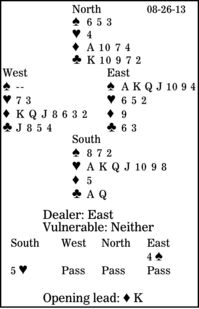Bridge column, August 26: Take your time, notably at trick one

At the bridge table, it's often not so much knowing when to play, as when to pause for thought. That applies in particular at trick one. The more thinking at trick one, the better you will play, whether you are the declarer or a defender.
In today's deal, how should South play in five hearts after West leads the diamond king?
The bidding was short but exciting. East's four-spade opening bid would have usually been based on an eight-card suit, but was understandable since he was nonvulnerable. However, South had an easy five-heart overcall. West wondered about six diamonds, but knew it would be a wild action. (Six diamonds doubled can be defeated by seven tricks, minus 1,700.)
Now to this difficult declarer-play problem. Given the opening lead, South has only 10 top tricks: seven hearts, one diamond and two clubs. Yes, the club jack might drop singleton or doubleton, but that is unlikely. And assuming it does not appear, how can declarer possibly get home?
There is one chance: South must find West with the club jack. And, even harder to realize, declarer must not win the first trick.
Let's assume West continues with the diamond queen. South ruffs in his hand, draws trumps, cashes the club ace, and overtakes the club queen with dummy's king. Then he continues with the club 10, pitching a spade from his hand. West takes the trick, but must give the lead back to the dummy and allow declarer to discard his last two spades.
** ** **
COPYRIGHT: 2013, UNITED FEATURE SYNDICATE
DISTRIBUTED BY UNIVERSAL UCLICK FOR UFS

